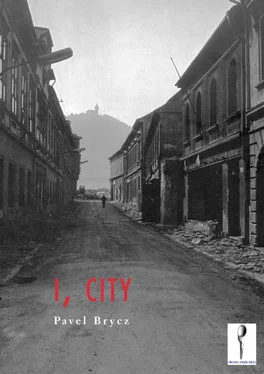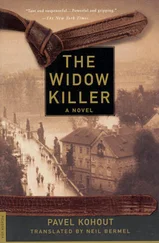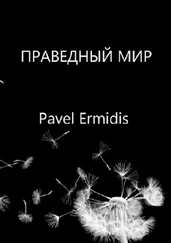Pavel Brycz - I, City
Здесь есть возможность читать онлайн «Pavel Brycz - I, City» весь текст электронной книги совершенно бесплатно (целиком полную версию без сокращений). В некоторых случаях можно слушать аудио, скачать через торрент в формате fb2 и присутствует краткое содержание. Год выпуска: 2006, Издательство: Twisted Spoon Press, Жанр: Современная проза, на английском языке. Описание произведения, (предисловие) а так же отзывы посетителей доступны на портале библиотеки ЛибКат.
- Название:I, City
- Автор:
- Издательство:Twisted Spoon Press
- Жанр:
- Год:2006
- ISBN:нет данных
- Рейтинг книги:5 / 5. Голосов: 1
-
Избранное:Добавить в избранное
- Отзывы:
-
Ваша оценка:
- 100
- 1
- 2
- 3
- 4
- 5
I, City: краткое содержание, описание и аннотация
Предлагаем к чтению аннотацию, описание, краткое содержание или предисловие (зависит от того, что написал сам автор книги «I, City»). Если вы не нашли необходимую информацию о книге — напишите в комментариях, мы постараемся отыскать её.
Dubliners
I, City
I, City — читать онлайн бесплатно полную книгу (весь текст) целиком
Ниже представлен текст книги, разбитый по страницам. Система сохранения места последней прочитанной страницы, позволяет с удобством читать онлайн бесплатно книгу «I, City», без необходимости каждый раз заново искать на чём Вы остановились. Поставьте закладку, и сможете в любой момент перейти на страницу, на которой закончили чтение.
Интервал:
Закладка:
He, a man of wine and love. He defended me. As he was a Latinist, at sixty-five he without a care in the world stood up to a beer-filled horde of vandals who were giving me such a beating that the windows were falling out of my bus stops.
He, a man and the Last Moravian and violin and wine and love and Latinist and Where is My Home and against him a sieg heil of hoodlums — he pitied them, for the beating they were giving to the city and him, because there is no one with legs that are long enough to run away from himself, when he has in him spite and a small house painter named Adolf Hitler.
Still bleeding from the temple, he was thinking of his violin and protected his hands from the vandals so that he could still play the songs of his Hanka Haná, as he nicknamed his little Moravia.
No, a couple of boys couldn’t hurt him, who was so much above them. Just as they couldn’t hurt me.
The old man lived with the violin for a long time after. With it, he told me stories short and long, about Hanička Haná and about his life, how he had said goodbye to it a few times during the war and yet here he is still, old as Methuselah.
And then… one day. But what could I tell you — you know it all already! The world died for a moment. And then it created itself anew. As our pupil František from the city of Paris would write: “He left and cannot be found.”
And as Pavel Brycz, a copywriter for the EuroTel advertisement, would write: “He left and didn’t take his cell phone with him.”
We’ll never be able to call him anymore, to tell him that though he might have become a Titan, we always loved him as he was, and that without him here we’re only little lost boys, who though now without a violin still sing his song about Hanka from Moravia…
I thank You that You gave birth to me,
All the hills around the river
Today I would forget gladly
Not to think about your bosom in November
Not to think about your bosom in November.
Today in our sad cold river
We took for a mirror gladly
There is no place for the two of us anymore
There is no place for one.
And below the dam there lives the sun
And the echo under the bridge is fervent.
Hanička… Hana!
Shrieking, burning still.
AN APPEARANCE, PIGEON
He wanted to become a pigeon. Another son of the city. He wanted to fly and to fly away, whenever he needed to. He needed to often. When he ignited his parents’ carpet with Kanagom glue, when he lay down on a street to hitchhike a car up to Paradise, when he climbed a high-voltage pole, when he stood on a tram’s shaft-bar, when for the first time he fell four over the legal limit for alcohol and wasn’t able to get up again. He needed to become a pigeon, when he was in love and she thought he was only being dirty. He needed to fly away, when he got a taste of “ginger,” speed, and not the kind they make in Pardubice. He needed wings. He needed to wave to the world from high altitude. Now he’s gone. He sniffed Čikuli stain remover and flew off far away from me, though he lies dead on one of my streets. I, city, don’t know how to shed tears. Because of one boy, the rain won’t fall from the sky.
I know, he was mean. Neither his mother nor father could love him.
Whoever met him avoided his mean eyes.
And now here he lies, a police photographer immortalized his face, sleeping, not tired from all the fights and all the rage in his heart. They’ll send his face to be exhibited IN MEMENTO MORI. You’ll see a face you won’t recognize.
You’ll shield your eyes in horror.
Ecce, homo!
I know, he was mean and the punishment was harsh.
But I saw him wrestling with a boa constrictor below a big-top, and only to prove that he didn’t know from tears did he allow the coils of the snake to break a few of his ribs.
Do you know what he did with the money he won?
He invited those who feared him and banqueted them.
That was his nature.
If only he were a pigeon! If he only had wings!
Then he could fly away from the eyes of all and preen his wounded feathers, invisible, all the way up on the highest spire of his city.
AN APPEARANCE, COSMIC
“Hug me,” said the boy to the girl.
“Hug me or I’ll strangle you,” the voice added, all of a sudden breaking into a sobbing barely suppressed.
There was darkness. The stars were not shining and the electric lamps were out of order.
I couldn’t see a step in front of me, I, city, who should be aware of everything around.
Something desperate was happening here. A boy and a girl were becoming confused with one another, and were left totally in darkness. Yet a short while ago they likely sat in the twilight of the Kosmos Cinema gazing up at a love story. Yet a short while ago the stars on the screen were likely glowing for them.
“We’ll always have Paris,” Humphrey Bogart said to Ingrid Bergman, “We’d lost it. But we got it back last night.”
Doubtless these two also dreamt that they would always have something.
“Your soul wouldn’t mind being pleasured by an émigré in a grand hotel. What’s worse is all this darkness suddenly around us,” says the boy.
I, city, am listening to their desperate voices and there is nothing I can do. I can’t move. I can’t run away when love is on its way out.
I have to wait, wait patiently until another day.
After the sunrise, to see only two bronze figures, statues outside the cinema, held in an eternal embrace.
As if nothing had happened that night.
As if love hadn’t left?
Perhaps those two fell from Mars!
Or was it they who were whispering during the night?
AN APPEARANCE, CHRISTMAS
He stopped for the girl on the way from Prague.
It took him a long time to persuade her to get in, that he wouldn’t hurt her. She’d been leaving a bloody trail behind her as she walked the road from Prague on high heels. He saw she was a small runaway.
In her palm, she held a small secret. The driver looked straight ahead. He didn’t want to frighten her. To drown the silence of her fear and clenched knees he turned on some music. It was a foreign song. The girl recognized the singer was singing in Spanish, or Portuguese.
“Are you water, or only a thirst on my way?” the driver translated.
“Oh,” said the girl.
They didn’t talk anymore.
He dropped her off at a crossing before a department store. He was afraid to wish her Merry and Happy aloud, and so he wished it to her in his heart. He saw what the girl needed most was some rest.
To take off those bloody pumps of hers.
He was driving away and turned off the music; he wanted to think.
Is the world really only a shelter for those forsaken?
The girl was thinking, too, as she stood at her parents’ door. Is there still time, or is it already too late for everything?
Is there silence or accusations between her mother and father? What’s happened with them since she left? Have they grown old? Have they grown old like she has? They’d been beautiful, she remembered them as they were. She took after them both, the most beautiful girl in Most.
I, city, should know that.
Now she’s not anymore. In three years, you can change beyond recognition. And you can get ugly when you live in a manner that turns your stomach.
And hers turned often. Once, she even vomited on a Salvador Dalí painting.
It was in Prague in 1988, in the Sternberg Palace at the exhibition of the Guggenheim collection.
Back then Dalí wrote her:
Читать дальшеИнтервал:
Закладка:
Похожие книги на «I, City»
Представляем Вашему вниманию похожие книги на «I, City» списком для выбора. Мы отобрали схожую по названию и смыслу литературу в надежде предоставить читателям больше вариантов отыскать новые, интересные, ещё непрочитанные произведения.
Обсуждение, отзывы о книге «I, City» и просто собственные мнения читателей. Оставьте ваши комментарии, напишите, что Вы думаете о произведении, его смысле или главных героях. Укажите что конкретно понравилось, а что нет, и почему Вы так считаете.












